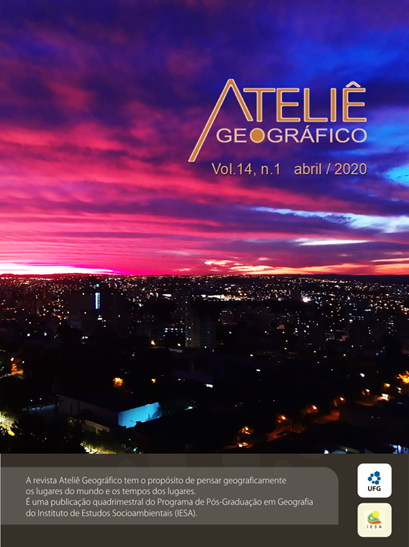Região Imediata de Dianópolis - Tocantins: interpretando suas atividades produtivas
DOI:
https://doi.org/10.5216/ag.v14i1.57702Resumo
O objetivo deste artigo foi analisar o desenvolvimento da Região Imediata de Dianópolis (RID), sudeste do Tocantins. Adotou-se o Quociente Locacional (QL) em relação ao pessoal ocupado em empregos formais nos oito setores econômicos, destacando a agricultura. Para cálculo do QL das atividades produtivas, coletou-se dados secundários na base de dados do Ministério do Trabalho e Emprego, entre 2006 e 2016. E, analisou-se a dinâmica do Índice Firjan de Desenvolvimento Municipal (IFDM), relacionando os valores deste com o QL. Observou-se que somente os municípios de Almas, Aurora do Tocantins e Novo Alegre possuíam QL significativo para agropecuária, extração vegetal, caça e pesca, em 2006. Por outro lado, 10 (71,4%) dos 14 municípios, possuíam QL significativo para Administração Pública em 2006, alterando para 11 (78,6%) em 2016. O desempenho locacional indica o avanço das atividades agropecuárias em 50% dos municípios da RID em 2016. O alto valor de QL para o referido setor em 2016 reflete os impactos positivos do projeto de irrigação Manoel Alves, inaugurado em 2008.
Palavras-chave: Desenvolvimento Regional, Região imediata de Dianópolis, Quociente locacional.
Downloads
Downloads
Publicado
Como Citar
Edição
Seção
Licença
Autores que publicam nesta revista concordam com os seguintes termos:- Autores mantém os direitos autorais e concedem à revista o direito de primeira publicação, com o trabalho simultaneamente licenciado sob a Licença Creative Commons Attribution que permite o compartilhamento do trabalho com reconhecimento da autoria e publicação inicial nesta revista.
- Os autores não serão remunerados pela publicação de trabalhos na Revista Ateliê Geográfico. Além disso, os conteúdos publicados são de inteira e exclusiva responsabilidade de seus autores, ainda que reservado aos editores o direito de proceder a ajustes textuais e de adequação às normas da publicação.
- Autores têm permissão e são estimulados a divulgar seu trabalho online (ex.: em repositórios institucionais ou na sua página pessoal), já que isso pode gerar alterações produtivas, bem como aumentar o impacto e a citação do trabalho publicado (Veja O Efeito do Acesso Livre).


